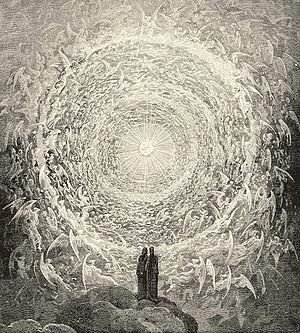
The Illusion and Danger of Knowledge
Adi Da Samraj, November 10, 2004
(Title and sub-titles are Beezone’s)
Adi Da Samraj: You refer to yourself every time you say a sentence because that’s how sentences are supposed to be constructed, and yet you have no experience of that ‘self’ that you keep referring to. You don’t experience it any more than you experience the room. You can experience ‘yourself’, so-called, from the point of view of the moment or what could be called the ‘late time’ of every perception and thought. It’s the ‘late time’ because it’s after when it occurred. But it’s called the present because it seems to be happening now.
THE GUESSING GAME
You are in the Transcendental or Divine Position, and the mechanics of conditional experience are all wrapped up with space/time and location, ‘point of view’ and so on. This creates illusions about the universe as well as ‘self’ and has you wondering about things based on this construct. It’s just as much a metaphor or myth, mythic construction, to be thinking as you are based on what scientists have developed as a description based on theory and experiments and so forth up to this date.

Paradiso Canto 34 – created to illustrate Dante Alighieri’s Divine Comedy. Gustav Doré published this image in 1868
But you’re not actually experiencing the world on the basis of that analysis. You have a picture of it somehow though. It looks different than the picture people had of the universe 2,000 years ago when they could say and seem to be speaking perfectly reasonable that a man went up into the air, disappeared behind the clouds, but presumably kept on ascending through the layers of the crystal firmament until he got to heaven and sat down in a chair next to the creator of the universe. That sounded to be a perfectly reasonable description 2,000 years ago because it was based on the picture of the universe that was the convention at the time. Some people still think it must be a Polaroid of what happened. They don’t get it. It’s a myth. It’s the language of an epic long past, and it never did describe a reality. It pictured a philosophy.
Devotee: They didn’t have your wisdom beloved.
WHAT YOU SEE IS WHAT YOU GET
Adi Da Samraj: Well, they also didn’t have the scientifically based knowledge that gives everybody a different picture of the universe now. You function, people today, generally speaking anyway, function on the basis of a picture of the universe inherited from scientific discourse. But you don’t understand, this is just as much a myth as the myth of the earth being a flat place, infinitely extended and over which there is a firmament of layers of crystal from which the stars are hanging. Above all of those layers, there is heaven or the place of God.

Messier 17 / Omega Nebula or the Swan Nebula. This vast region of gas, dust and hot young stars lies in the heart of the Milky Way in the constellation of Sagittarius (The Archer).
That’s actually how people thought the universe was built then. Of course now everybody says, “Those naive ancients, you see what do they know?” Right, what did they know? They didn’t know anything about it, you see. So they made it up? Yeah, they made it up and so did you. You see? You have a picture of the universe. You have a room you’re sitting in that you even. There are people here and people otherwise listening to me right now who participated in making this building. I did too, you see, and designing it and so forth. Others did the physical construction work.
And yet, none of them sees the room as it is. None of them knows themselves, which they keep pointing to and referring to, and nobody knows the universe, which they are picturing. You are operating mythically through habits of mind, conventions of mind. You don’t live in the real universe supposedly being described by science. That science is only, as a discipline, gone up to however far it’s gone in this moment and knowing about anything. It’s also a particular discipline that can only know about things in a certain mode anyway. It’s not a method for knowing certain kinds of things because it is a method based on natural observation and natural proof.
‘EGO’ / ‘POINT OF VIEW’ – PERCEPTION AND KNOWLEDGE
That excludes other kinds of knowledge, and it doesn’t make other kinds of knowledge false. To say that other kinds of knowledge is false, are false, is to be prejudiced about other kinds of knowledge or other modes of experiencing. The presumed knowledge based on scientific method is a construct based on point of view. That’s the same basis on which moment-to-moment ordinary experience as an ego is based on. The scientific method is ego based, an ego based method of knowing. It serves the purposes of egos. It serves the purpose of point of view. It is a picture of the universe from the perspective of point of view. The point of view can be moved around to different locations and so forth, but all of its language of description is point of view based.
It’s not based on knowledge from the so-called perspective of all possible points of view or the transcends point of view. It’s not any more a perfect knowledge of reality than the ancients presumed in their picture of with crystal domes on top of it, with stars hanging from rods. Only, it is ego based on what could genuinely be called a very primitive state of knowledge. It’s just enough knowledge to destroy the world.
Devotee: Yes.
FEAR UNDERLIES POINT OF VIEW
Adi Da Samraj: But it’s not enough knowledge to be enlightened about reality. It falls far short of that. It’s used for power. It’s the method of fear. When it comes down to it, science is a search for control over the dangerous universe, and it serves the purpose of protecting or giving power to mortals or to beings that are bound in time and space and to point of view and who don’t even know themselves or even what so much as a single thing is.
It’s very presumptuous knowledge. It’s very self-protective and fearful. It is even a kind of knowledge possessed by the powerful that winds up frightening everyone.
What is the good of this knowledge, you see? It’s the same as having an elaborate and powerful egoic existence. What is the good of it? Is such a being happy? Does such a being do good? Is to have a lot of mechanical worldly power and wealth and so forth, is that a good achievement? Is the collective powerfulness and knowingness of mankind making mankind happy and producing a unity of existence in which people are thriving, at least within the limits of mortality in some positive manner, or is it becoming more and more a deadly competitive place in which knowledge in the scientific sense is the method of power and destruction?
Devotee: It’s a dangerous intoxication Beloved.
GENUINE WISDOM
Adi Da Samraj: Yes, it is. As it said in power corrupts, absolute power corrupts absolutely. Inversely, it’s also said powerlessness corrupts, and absolute powerlessness corrupts absolutely. You can’t win as an ego. egoic society, ego-based society can’t win. Ego-based knowledge isn’t a winner. You see? That doesn’t mean that there’s no use in it. It has all kinds of used potentially. Practical and positive. Also negative. It has both sides, all sides.
In summary, it has all of the virtues and limitations of egoity itself, and it is, whether taken the form of power or powerlessness, still bondage or an exercise in the circumstance of bondage and delusion has nothing to do with happiness or realization of reality ultimately. It’s not enough. At best, it has a subordinate use in the midst of human existence and should be subordinate. Not merely to conventional religiosity, but to the exercise of genuine wisdom and self-transcending communion with reality itself. Egoity, whether you make a lifetime out of it or an entire culture out of it, becomes a dreadful destiny.
Further Readings:
